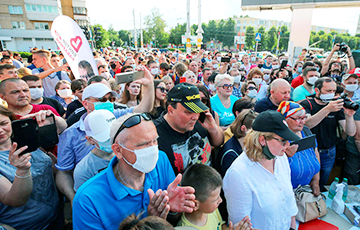Voice Of America: There Are Cracks In Lukashenka’s State Apparatus
25- 16.07.2020, 13:08
- 148,147

The protest movement in Belarus is intensifying, and could change the political landscape.
In Belarus, protests continue against the inadmissibility of a number of candidates for the presidential election scheduled for August 9. On Tuesday, July 14, the country's Central Election Commission registered five candidates for the presidential race. However, the two most popular applicants - former banker Viktar Babaryka and former diplomat and entrepreneur Valer Tsapkala - were denied registration, Voice of America reports.
A criminal case was opened against Viktar Babaryka, the ex-head of the Belarusian Belgazprombank owned by the Russian Gazprom. At the end of May, the popular blogger Siarhei Tsikhanouski was also arrested on charges of preparing actions that violate public order, and of having ties with Russia.
This led to major protests in Minsk and other cities, which have been going on since mid-June. Protests of the Belarusian diaspora are also taking place in many countries. In Belarus, the country's authorities resort to repression and suppression of peaceful protests with the disproportionate use of force. In recent days, many activists, as well as media workers, have been detained.
The situation in Belarus and potential changes in the country were discussed by the experts during the online event “Confrontation? Belarus on the eve of the presidential election”, organized by the Center for European Policy Analysis in Washington on Wednesday, July 15.
British analyst and political risk consultant Katia Glod notes a strong drop in ratings of President Lukashenka.
“People want change,” says Katya Glod, adding that this trend is visible among both the older and younger generations.
Vytis Jurkonis, an expert at Freedom House, a non-governmental human rights organization, stresses that President Lukashenka is definitely “nervous” because he has faced wider protests than any opposition movements in the past.
“It's a really wide range of people,” he says. The expert adds that the international community should support civic engagement in Belarus. Non-governmental organizations, independent media and other organizations that work in this direction operate in a very complex environment, he adds. In addition to supporting them, Western politicians should raise issues of restoring freedoms in cooperation with Minsk and be united in condemning repressions.
Vytis Jurkonis also supports the introduction of personal sanctions against those involved in repression and human rights violations in Belarus.
Brian Whitmore, director of Russia's research program at the Center for European Policy Analysis, agrees that the West needs to protect human rights and democratic freedoms in Belarus.
Journalist of the Belarusian service of Radio Liberty / Free Europe Kastus Lashkevich noted that a significant part of the society is extremely tired of Lukashenka.
He also noted that independent media continue to work under pressure from the authorities, and in a hostile environment. However, he notes that the number of people seeking alternative sources of state propaganda is growing in Belarus.
“The government has lost the battle for an online audience,” says Kastus Lashkevich, noting that online bloggers are growing in popularity in the country, especially in the regions.
Answering the question from the Voice of America Russian service about how strong Lukashenka’s support from security services and elites remains, Katya Glod noted an interesting trend.
At the technocratic and lower level of the state apparatus, one can see a decrease or lack of support for Lukashenka, and there is also a certain split among the elites. So, Viktar Babaryka and Valer Tsapkala are part of the business elite, she notes. A number of famous people in the country, as well as journalists criticized the Lukashenka regime, however, whether the split among the elites and the state apparatus can increase, largely depends on the further mobilization of civil society, the analyst says:
“The state apparatus is still strong, but we see some cracks that the civil society should use and ensure their (employees of the state apparatus) support ,” emphasizes Katya Glod.
Experts say they would like to see democratic and independent elections in Belarus.
Now the most successful development of events in Belarus would be the “Armenian scenario,” said Vytis Jurkonis. In May 2018, a “velvet revolution” took place in Armenia, when opposition leader Nikol Pashinyan became prime minister. As a result of massive peaceful protests, the former Armenian President Serzh Sargsyan failed to take the prime minister’s post.









